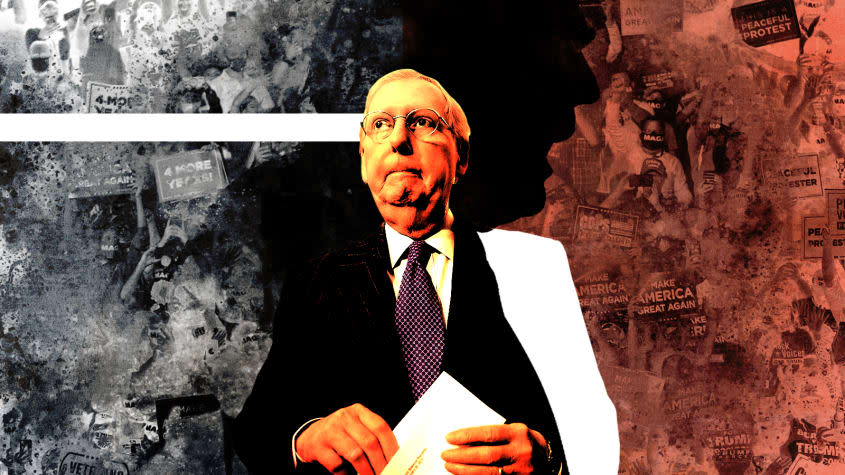Did Trump's 'death wish' comment toward McConnell go too far?

- Oops!Something went wrong.Please try again later.
- Oops!Something went wrong.Please try again later.
At the end of September, the Senate passed a stopgap spending bill to fund the government through Dec. 16, with 22 Republicans — including Senate Majority Leader Mitch McConnell (R-Ky.) — joining all 50 Democrats in support, The Washington Post reports. But McConnell's backing soon angered former President Donald Trump, who subsequently posted an angry rant against the minority leader on his social media site, Truth Social. In his post, Trump wrote that McConnell must have had a "DEATH WISH" (yes, in all caps) for agreeing to the stopgap bill, before then making racist comments toward McConnell's wife, Elaine Chao, a Taiwanese-American who also served as the former president's transportation secretary, the Post continues.
Trump's anger toward McConnell doesn't just stem from the funding bill; he's targeted the minority leader for a while, especially since McConnell condemned Trump's actions on Jan. 6, 2021. But the former president's inflammatory Truth Social post was akin to incitement of violence, critics say, and the GOP hasn't exactly been forthcoming in its response. Below, thought leaders weigh in: Did Trump's "death wish" comment go too far?
It's bad even for Trump
The former president is no stranger to inflammatory statements, but the McConnell post was bad ... even by his standards, some argue. Per Bernard Goldberg, an opinion contributor for The Hill: "Donald Trump always puts himself first — even if it may put people he doesn't like in harm's way." And though supporters have argued that Trump was simply referring to a political death wish — not a literal one — Goldberg still isn't convinced: "If that's what he meant, he easily could have said so. He didn't. Instead, he played with fire," he writes. The post was "a dangerous way to settle a personal vendetta, even by Donald Trump standards."
The Wall Street Journal Editorial Board agreed, noting there could be real consequences to Trump's words. "It's all too easy to imagine some fanatic taking [Trump] seriously and literally, and attempting to kill Mr. McConnell," the board said, comparing the former president's post to the rhetoric he used to talk about former Vice President Mike Pence and the resulting "Hang Mike Pence!" chants on Jan. 6, 2021.
Will we ever hear more than crickets from the GOP?
Many members of the GOP have yet to properly comment on the incident. For example, when asked about the comments, Florida Sen. Rick Scott (R) said he "can never talk about and respond to why anybody else says what they said"." He also dismissed the racist comments toward McConnell's wife as just a "nickname."
The Editorial Board of the St. Louis Post-Dispatch argues that silence from Republican leaders shows that they "view this dangerously unstable ex-president as untouchable, no matter what he says or does." And despite Trump's words, many Republican candidates in the upcoming midterms attended a rally with him in Michigan. "This is the behavior of a cult," added Rex Huppke, columnist for USA Today. He continued: "How is it possible for Republicans to continue supporting a malignant figure who would unleash his hateful hounds on them in a heartbeat?"
Trump's threats are dangerous and cannot be ignored
Despite Trump's history of maligning his opponents, "simply ignoring his utterances isn't really viable, attractive as it may seem," writes John Cassidy, columnist for the New Yorker. For one thing, the former president's incendiary words come as two major political struggles are unfolding: "a low-intensity civil war in the Republican Party and a high-intensity effort by Trump to persuade his supporters that his ... adversaries are illegitimate," Cassidy says.
But the former president's tendency to belittle his opponents sheds light on a larger problem, Cassidy posits: In painting a picture of persecution against himself and his supporters, Trump positions criticism as "treasonous" — and that's dangerous to the political system.
Adds Chris Cillizza, CNN editor-at-large: "[W]e shouldn't simply dismiss this latest outrage. To do so is to normalize this sort of behavior."
You may also like
Did Trump's 'death wish' comment toward McConnell go too far?
5 scathing cartoons about the Herschel Walker abortion allegations
New documents raise more questions about Ron DeSantis' migrant flights

